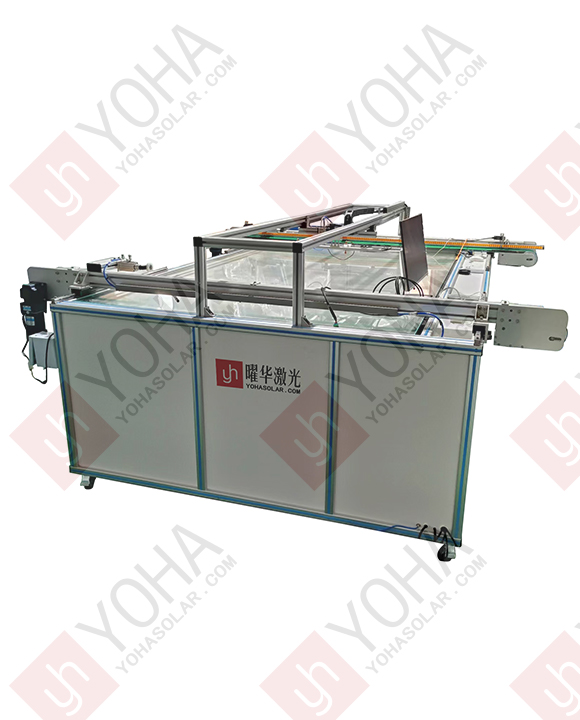Online Solar Module EL Defect Detector
The Online Solar Module EL Defect Detector is a highly precise, automated, non-destructive testing device integrated into photovoltaic production lines. Utilizing the principle of Electroluminescence (EL), it automatically performs rapid imaging and real-time analysis on solar modules without manual handling. It accurately identifies various internal defects and process issues, including micro-cracks, finger interruptions, broken cells, black cores, sintering defects, and PID degradation.

Product Features
Fully Automated Online Integration: Directly integrated into the PV module production line, the device seamlessly connects with the conveyor system. It enables fully automated inspection during module flow without manual intervention or stopping the line, significantly improving production efficiency and output.
High-Precision Rapid Imaging: Employs high-performance scientific-grade CCD/CMOS cameras and precision optical systems. Captures high-speed, high-resolution images of weak EL signals generated when a low-voltage direct current is applied to the module, ensuring clear visualization of defect details.
Comprehensive and Accurate Defect Identification: Based on advanced image processing algorithms and Artificial Intelligence (AI) technology, it automatically, precisely, and reliably identifies multiple critical internal defects. These include but are not limited to: cell micro-cracks (bright/dark cracks), finger interruptions, broken cells, black cores/black spots, sintering defects (over/under-fired), cold soldering, chipped cells, foreign objects, scratches, edge defects, and PID degradation.
Non-Contact Non-Destructive Testing: The entire inspection process is contact-free. Using the EL principle, it directly reveals electrical performance defects inside the cells, constituting a completely non-destructive test that causes no physical damage or performance impact to the module.
Efficient and Stable Operation: Designed for industrial environments, it offers high stability, reliability, and long service life, capable of meeting 7x24 continuous production demands. Modular design facilitates maintenance and upgrades.
Technical Specifications
Model: YHEL-2400
Applicable Process Stage: Defect detection for pre/post-lamination modules
Test Specification: monocrystalline, polycrystalline cell modules
Camera Type: YOHA Specialized Camera
Resolution: EL: 24MP / 48MP
Imaging Mode: Single/Dual Camera Mode
Sensitivity: Detects cracks narrower than 0.03mm
Loading Method: Automatic Loading/Unloading
Detection Method: Automatic Detection
Effective Test Area: 2600*1500mm
Stabilized Power Supply: 60V/20A
Image Acquisition Time: 1~60s (Adjustable)
Power Supply: 220V/50HZ
Equipment Dimensions (LxWxH): 2900×1940×1155mm
Product Applications
Full-Process Quality Control in PV Module Production: Serving as a core quality inspection tool on the production line, it is applied at critical stages: incoming material (cell) inspection, post-soldering/layup, pre/post-lamination encapsulation, and final product outgoing inspection. By enabling real-time, non-destructive detection of internal defects, it strictly controls quality at each step, preventing defective products from moving downstream or reaching customers, significantly improving yield and product reliability.
PV Power Plant Module Receiving Inspection & Installation QC: During PV power plant construction, used for batch sampling or full inspection of received solar modules to verify if internal damage (e.g., micro-cracks) occurred during transportation or handling. It can also be used for re-inspection after modules are mounted on racks (installation stress testing) to ensure the installation process caused no damage, laying a quality foundation for long-term stable operation and preventing power loss or safety hazards due to latent defects.
PV Power Plant O&M Fault Diagnosis & Performance Assessment: As a vital diagnostic tool for plant operation and maintenance, used for periodic inspections or troubleshooting. When abnormal performance degradation (e.g., reduced output, hot spots) is detected, EL testing quickly and visually locates internal defects (e.g., severe micro-cracks, broken cells, PID effect, cell failure, soldering failure), accurately determining the cause and severity to guide repair or replacement decisions, maximizing power generation revenue and asset value.
R&D and Process Improvement Support: In PV module/cell R&D labs and process improvement departments, the EL detector is a key device for evaluating the reliability of new materials, structures, and processes (e.g., novel cell technologies, different soldering/encapsulation methods). By comparatively analyzing EL images under various conditions, it enables in-depth research into defect formation mechanisms, distribution patterns, and performance impacts, providing strong data support for continuously enhancing module design, optimizing manufacturing processes, and improving product lifespan.
